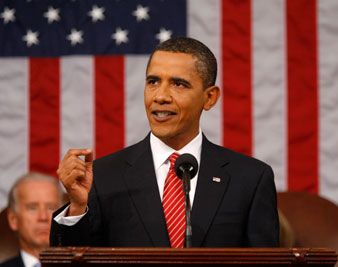 Reuters Photos
Reuters Photos
President Obama speaks about healthcare reform before a joint session of Congress on Capitol Hill in Washington
This article originally appeared on The Daily Beast.
In a plain-spoken, at times tough, and masterful address to a joint session of congress, President Obama spoke in pragmatic and moral terms about the importance of healthcare reform as a test of our nation’s character. He called for sweeping action, including most notably outlawing insurance companies from denying coverage because of preexisting conditions. Security and stability was a refrain. A call to end children’s games was an almost biblical subtext as the President spoke powerfully of the need to move beyond the ugly circus of August. “The time for bickering is over. Games are over.”
The speech still had a bipartisan flavor, but with a progressive spine.
On the imperative of a public option, Obama did not fully satisfy. The insurance exchange idea confused more than it clarified in explaining the role of the public option. Why will it take four years? Essentially, it’s a compromise because Congress doesn’t have the guts to raise money to do it more quickly. There may be some benefits up front, but there are still more questions than answers. What is clear is that the fight must still be waged to push through a public option –already a part of four of the five bills in Congress–if we’re to get an essential component of genuine and effective healthcare reform. After all, the public option is already a pragmatic all-American compromise (choice and competition). Medicare for All–or single-payer-was never on the table.
Obama likes to say that the perfect is the enemy of the good. But what if the weak is the enemy of the good? And the shout-outs to the left were at times patronizing–as if he had to do triangulation 2.0
Still, Obama’s invocation of history was powerful. When he pointed out that Congressman Dingell’s father had proposed very similar legislation in 1943 it was great symbolism and great politics. In invoking the great reform Presidents–Roosevelt and Johnson–and the battles they waged against reactionary lobbies in fighting for universal health care, Obama placed himself in the American pantheon.
“I am not the first person to take up the cause of health care but I am determined to be the last.”
Despite the days of right wing rage, and the metastasizing lies and misinformation, Obama said, perhaps with Machiavellian intention, that he would still seek common ground in the weeks ahead. “But, know this,” Obama insisted. “I will not waste time with those whose calculation is that it’s better politics to kill this plan than improve it.” And in that masterful phrase, he placed the burden on those who would seek to cripple, or kill, healthcare reform to damage his young presidency. Obama was most feisty in saying ” instead of honest debate, we’ve seen scare tactics,” and his “call out”of those (especially those who are spooking seniors) who would misrepresent his plan.
And then there were those male, pale and stale Republicans. South Carolina Representative Joe Wilson’s shout in the hall of “liar” showed that the megaphones of misinformation are not isolated to the delusional FOX studios of Glenn Beck or the padded radio chamber of Rush Limbaugh. Obama rightly called the GOP out for their hypocrisy in defending Medicare, a program they have labored hard to cripple.
There was much pragmatic talk–of security and stability and bending the curve and deficit neutrality and finding savings within existing Medicare system. But it was when Obama spoke of Senator Kennedy and the larger moral imperative of healthcare reform that this became a great speech. One for the history books, in fact. Obama reminded us that this reform was, as Kennedy believed, “the great unfinished business of our society.” That it is a “moral issue” about the fundamental principles of social justice and the character of our country. It is about the human condition, about the history of our progress of our nation.
In many ways, it was Obama’s fullest, most eloquent and formal defense of liberalism and the clearest exposition of his view of government’s role. It was not the full-fledged antidote to Reagan’s decades of government-is-the-problem conservative narrative. Yet Obama spoke eloquently of a new and progressive role for government. We must build on it.
There is work ahead to fulfill the promise of shaping a more humane and healthier future. But on the evening of September 9th, eight years after President George W. Bush spoke to a joint session of Congress, President Obama has set us on a path we must seize in the critical days and weeks ahead.


